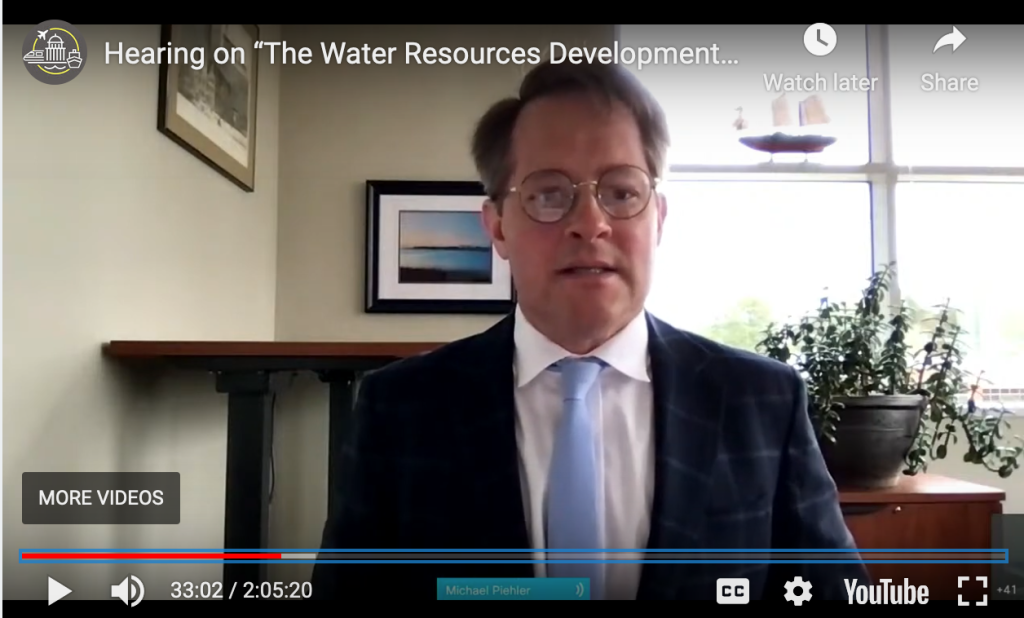Piehler testifies before U.S. House of Representatives subcommittee on flooding and resilience in NC
March 30, 2021
On Tuesday, March 23, 2021 Mike Piehler, director of the UNC Institute for the Environment, was a witness before the U.S. House of Representatives Subcommittee on Water Resources and Environment. Piehler gave testimony and answered questions about research at Carolina and the value it can provide to the U.S. Army Corps of Engineers while implementing The Water Resources Development Act of 2020 (WRDA 2020).
The Subcommittee on Water Resources and Environment has oversight of the U.S. Army Corps of Engineers and invited experts in their field to provide their experience with flooding and resilience in their respective communities. Congress has granted significant responsibility to the Corps to carry out vital water resources development and has been tasked with implementing policies enacted in WRDA 2020.
“North Carolina is an excellent model system to consider the essential provisions of WRDA 2020,” Piehler said. “North Carolina has an impressive extent and diversity of coastal habitats that deliver value to both people and the natural system. Unfortunately, North Carolina has also had more experience than we’d like with hurricanes, having had 36 storms affect the state since the late 1990s. These storms present threats from wind, storm surge, and precipitation. In records kept since 1898, six of the seven biggest rain events in North Carolina have occurred in the past 20 years.”
Piehler outlined current research at Carolina and the importance of convergence research, which is an approach that engages interdisciplinary research teams with stakeholders and communities to tackle complex problems with relevance to society.
“It is clear that flooding is a transdisciplinary challenge and cannot be solved with individual expertise, but rather requires the integration of multiple concepts to develop new perspectives. Our team includes natural scientists, social scientists, and engineers who have the shared goal to provide new information to reduce damage from floods and storms, and as a result create economic, environmental and social benefits,” Piehler said.
The research team’s work in Wilmington, NC, highlights the effectiveness of the convergence approach. The community’s reliance on its natural infrastructure, such as wetlands and beaches makes it vulnerable to uncertain environmental threats, such as harmful algal blooms, flooding and hurricanes. Community engagement at the front of the study strengthens the effort by being more comprehensive and robust. Their approach also emphasizes social science and connections to financial risk incurred by the community.
“In summary, embracing the interconnectedness and complexity of managing aquatic systems opens the door for solutions to a range of challenges,” Piehler said. “Consider a tidal marsh created through beneficial use of sediments. Evaluation of the dredging operation will have been improved by a clear vision of the beneficial fate of the sediment generated and the full suite of values delivered by the marsh. Sustaining the economy and the environment around quickly changing aquatic systems is a grand challenge, but it can be met, and it is clear that WRDA 2020 is poised to contribute to meeting this challenge.”
Kelly Dockham, federal affairs director at UNC-Chape Hill, noted that Piehler’s participation as a witness at the hearing is an example of Carolina faculty’s impact on state and federal level policy.
“As one of the top research universities in the nation we value the opportunity to share the latest findings from our researchers and to help identify solutions to challenging policy topics with lawmakers,” said Dockham.
To watch the full hearing or read the entirety of Mike Piehler’s testimony visit: https://transportation.house.gov/committee-activity/hearings/the-water-resources-development-act-of-2020-status-of-essential-provisions
Mike Piehler is the director of the UNC Institute for the Environment; professor of Marine Sciences and Environmental Sciences and Engineering and chief sustainability officer and special assistant to the chancellor for sustainability at the University of North Carolina at Chapel Hill.
